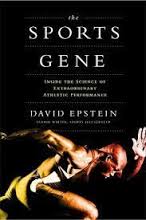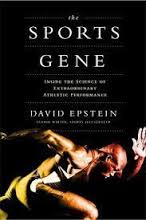What role does genetics play in the success of athletes competing at the highest levels? Well, it’s complicated.
David Epstein's book The Sports Gene: Inside the Science of Extraordinary Athletic Performance just came out in hardcover from Current and is available on Kindle soon.[1]
My own research interests include the non-deliberative dynamics of human interaction (currently in the context of affect theory as it relates to non-critical modes of interpretation in theatrical contexts—nerd alert). The excerpt from The Sports Gene published at SI.com fascinated me for its familiar human dynamics in a less-familiar context. Epstein’s questions arise from documented—and sometimes delightfully obscure—cases in sports past and present: Why can’t MLB superstars hit Jennie Finch? (They’re not even close.) How much do reaction times have to do with athletic talent? (Almost zero.) Are Jamaican sprinters (see Bolt, Usain), Kenyan distance runners, and NBA 7-footers genetic freaks with innate advantages? Well, it’s complicated.
The better we understand human genetics, the more difficult it gets to pinpoint genes for speed, height, eyesight, and the trademark attributes typically advantageous to athletes. Furthermore, thenurture component of athletic talent is as much a part of Epstein’s research if not the book’s marketing. How much part does training play? How much part does environment play? Epstein is persuasive that genes can make a defining difference, but we can’t just breed superheroes. The book is absolutely worth reading for this balanced consideration alone, and not just as it applies to sports. Here are a further few reflective take-aways:
Login to read more
Sign in or create a free account to access Subscriber-only content.
Topics:
